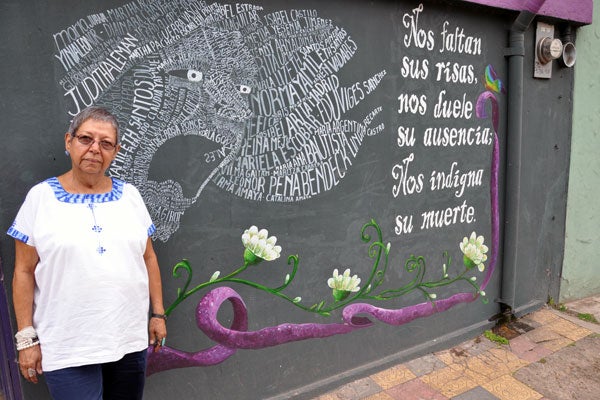
Murderous violence against Honduran journalists is on the rise
Published: January 29, 2014
Journalists who cover organized crime, government corruption and other sensitive issues are increasingly facing threats and lethal attacks in Honduras with almost complete impunity for perpetrators, a new study reports.
Honduras: Journalism in the Shadow of Impunity was produced by the International Human Rights Program at the University of Toronto Faculty of Law (IHRP), PEN Canada and PEN International. The report documents the rise in violence against journalists following the coup d’état that ousted President José Manuel Zelaya in June 2009, and the failure of both state and international mechanisms to investigate and punish those responsible.The report was authored by IHRP Summer Fellow Kaitlin Owens, who was part of a joint IHRP-PEN delegation conducting research in Honduras last summer. IHRP clinic students Liani Caban and Bhuvana Sankaranarayanan also contributed preliminary research.
Since June 2009 at least 32 Honduran journalists – most working for the broadcast media – have been killed and many more continue to work in a climate of fear and self-censorship.
"Honduras is in extreme crisis. This ground-breaking, incisive PEN report details the deadly coupling of corruption and impunity that is destroying Honduras. It is urgent that Honduras and the international community work together to strengthen the rule of law in the country," said Marian Botsford Fraser, chair of PEN’s Writers in Prison Committee.
 Increasing levels of violence and widespread impunity has made Honduras one of the most dangerous countries in the world. While transnational drug cartels are, in part, responsible for the rising homicide rate, much of the current crisis of violence is produced by state authorities, according to the new report.
Increasing levels of violence and widespread impunity has made Honduras one of the most dangerous countries in the world. While transnational drug cartels are, in part, responsible for the rising homicide rate, much of the current crisis of violence is produced by state authorities, according to the new report.
Corruption within the police force is alarmingly high, simultaneously undermining trust among state agencies, damaging public confidence in key institutions and ultimately hampering the institutional capacity of the justice system, researchers said. Their study found there are too many agencies that notionally address the problem of violence and impunity, resulting in a situation where no one is accountable for ensuring justice for victims and their families. (Image at right: the offices of the Committee of Relatives of the Detained and Disappeared, in Tegucigalpa, Honduras.)
"The current climate of pervasive impunity in Honduras is the result of failures in accountability for serious human rights abuses spanning decades," said Carmen Cheung, acting director of the International Human Rights Program at U of T's Faculty of Law.
"Violence thrives where impunity prevails," Cheung said. "Honduras will continue to be locked in a cycle of impunity and violence until there is meaningful accountability."
 The recent wave of murderous violence against journalists has been met with a familiar mixture of inadequate resources, bureaucratic ineptitude, blame-shifting and denial, said Cheung. She added journalists’ murders are rarely adequately investigated or solved.
The recent wave of murderous violence against journalists has been met with a familiar mixture of inadequate resources, bureaucratic ineptitude, blame-shifting and denial, said Cheung. She added journalists’ murders are rarely adequately investigated or solved.
Of the 38 journalists murdered since 2003, only two convictions have been obtained. (Image at right: detail of a poster of murdered journalists.)
PEN International, PEN Canada and the International Human Rights Program at U of T's Faculty of Law are together calling on the Honduran government to fully investigate all cases of murdered journalists. They are asking the government to empower existing state institutions and mechanisms and establish new ones where needed, to ensure that all members of the media are afforded the full protection of the law.
The three organizations’ key recommendations to the Honduran government are:
- Ensure that appropriate investigative bodies and protocols for crimes committed against journalists are established
- Empower the Special Prosecutor for Human Rights to investigate and prosecute the murders of journalists and human rights defenders and ensure that its office receives sufficient financial, human and technical resources to carry out its work
- Ensure that any new legal mechanisms intended to improve journalist security, such as the proposed Bill for the Protection of Human Rights Defenders, Journalists, Social Communicators and Justice Operators, come into effect with adequate financial, human and technical resources, as well as political will, in order to guarantee effective implementation.
The report also makes a series of recommendations to the Honduran media and the international community for the protection of journalists in the country, including a call for donor states such as the UK and Canada to work with Honduras on the issues. Canada, having signed a free-trade agreement with Honduras in November 2013, has important economic ties to the country, and may have particular influence.
"No change will come from the Honduran government acting alone," said Tasleem Thawar, executive director of PEN Canada, "Every country and international organization with interests in Honduras – whether economic, security-related, social or cultural – must tie their support to Honduras meeting its human rights obligations."



